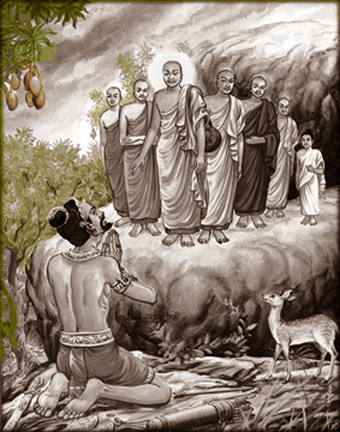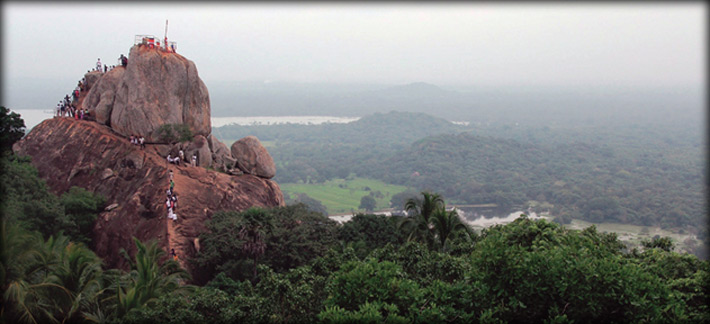|
Poson Poya falls on Thursday:
Environmental challenges: a Buddhist perspective
By Lionel Wijesiri
 World Environment Day was celebrated globally last Thursday. It was
the United Nations’ principal vehicle for encouraging worldwide
awareness and action for the environment. That day would have been an
ideal moment for all of us to sit back and think seriously how our
activities now challenge the health of our natural world more than at
any other time in history. World Environment Day was celebrated globally last Thursday. It was
the United Nations’ principal vehicle for encouraging worldwide
awareness and action for the environment. That day would have been an
ideal moment for all of us to sit back and think seriously how our
activities now challenge the health of our natural world more than at
any other time in history.
Since the middle of 20th century, western technology was spurred by
the belief that applied science could eliminate all human wants and
usher in a golden age of unlimited prosperity for all. Now, having
utilised technology to repress nature to serve human desire, we have
doubtlessly succeeded in making life more comfortable and become more
secure in many respects than it had been in an earlier era.
However, our smog-covered cities, polluted waterways, devastated
forests and chemical dumps remind us painfully that our material
triumphs have been gained at terrible price.
The planet’s natural ecosystems and regenerating bio-capacity are
being severely degraded and, as a result, this compromises the ability
of the planet to sustain life. Forests, fisheries, oceans, rangeland,
fresh water systems and other natural ecosystems are all threatened
while many are on the verge of collapse. Water, land and air are getting
increasingly polluted, water tables are dropping, soil erosion is
leading to desertification, global warming is well underway, and species
are dying out 1,000 times faster than their natural rate of extinction.
And in the process of vanquishing nature, man himself, too, has placed
himself in danger of losing his humanity.
Buddhist solution
|

Mahinda Maha Thera came to Sri Lanka from India on the full
moon day of the month of Poson and met King Devanampiyatissa,
and preached the Buddha doctrine. |
Does Buddhism offer us any guide on environmental protection? Yes, it
does but to understand it, we have look at Buddhism in a different
perspective.
Buddhism does not make the big distinction found in the West between
“nature” and human beings. It is stressed that we are not set apart from
nature, but that we are part of it. The doctrines of karma and of
rebirth put the whole of human life in the context of an endless series
of cycles, which resemble those which operate in the natural world (e.g.
the water cycle, the food cycle).
The Buddhists stress on impermanence reminds us that our bodies are
subject to the endlessly-changing processes of nature, whilst beliefs
about rebirth suggest that even our consciousness is recycled in
relation to a new body. The form of things changes constantly, but
certain basic patterns continue.
So, it should certainly not come as a shock for practising Buddhists
to discover what environmentalists are now telling us. That is, that
nature is not a boundless ocean of resources (the doctrine of
impermanence should have made this clear), and the actions that we
perform have an effect on the world around us.
In the theory of karma the effects of our actions are in proportion
to the greed which motivated them. So if our spoiling of the planet
through stripping its resources and polluting it was motivated by greed,
we are now beginning to experience the effects of that greed. The earth
is our mirror.
Metta
In fact, Buddhism represents the way of compassion. Buddha taught
that for those who wish to follow his Path should practice metta -
loving-kindness, not to harm the life of all beings - not only to
protect mankind, but also to protect animals and vegetation. With his
perfect wisdom, the Buddha saw all beings in the universe were equal in
nature, and in this phenomenal world, lives of all human, animals and
vegetation were inter-related, mutually developing, and inseparable.
The bottomless greed has pushed mankind to satisfy excessive and
unnecessary demands, and lead them into endless competitions, leading to
environmental damage and ending up in self-destruction. Contrasting to
the unwholesome and greedy mind is the spirit of simple living and
contentment by those who practise the Buddha’s teaching.
Several suttas from the Pali Canon show that early Buddhism believes
that there is a close relationship between human morality and the
natural environment. In this world there are five natural laws at work:
Utu Niyama, Bija Niyama, Kamma Niyama, Dhamma Niyama and Citta Niyama
(physical laws, biological laws, psychological laws, moral laws and
causal law). This means that the physical environment conditions the
growth and development of its biological component, i.e. fauna and
flora.
The morals of humankind influence not only the psychological make-up
of the people but the biological and physical environment of the world
as well. The five natural laws demonstrate that humankind and nature are
bound together in a reciprocal causal relationship with changes in one
necessarily bringing about changes in the other. The world, including
nature and humankind, stands or falls with the type of moral force at
work.
If immorality grips society, humankind and nature deteriorate; if
morality reigns, the quality of human life and nature improves. Thus
greed, hatred and delusion produce pollution within and without.
Generosity, compassion and wisdom produce purity within and without.
This is the reason the Buddha pronounced that the world is led by the
mind. Cittena niyati loko, cittena parikassati, cittassa ekadhammassam,
sabbeva vasamanvagu. (The world is led around by mind, by mind the world
is plagued, Mind is itself the single thing, which brings all else
beneath its sway).
True happiness
The true happiness of life is to be found through the restraint of
desire in a life of contentment rather than through the development of
greed. According to Buddhist doctrine, humankind must learn to satisfy
its real needs and not its desires.
The resources of the world are not unlimited but more than sufficient
to meet the limited needs of the humankind. But the modern humankind’s
unbridled voracious greed for pleasure and acquisition of wealth has
exploited environment to the point of near impoverishment. The crux of
the matter lies there. Therefore, the search for the effective tools to
battle against environmental destruction must also begin from there.
In the Karanaiya Metta Sutta the Buddha said,
As a mother would risk her life
to protect her child, her only child,
even so should one cultivate a
limitless heart
with regard to all beings.
In each of our lives we’re presented with myriad opportunities to
make small and large changes to reduce the negative impact we have on
the natural world. When we make these changes, not only will they
support our spiritual growth but also give us joy for contributing (at
least, a wee bit) to the well-being of all living beings on earth.
|

The traditional spot - Missaka Pabbata where King
Devanampiyatissa met Mahinda Maha Thera is revered by the
Buddhists. |
|

